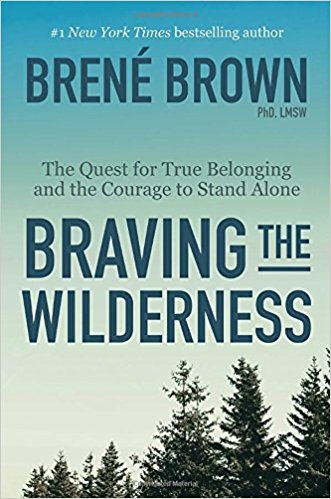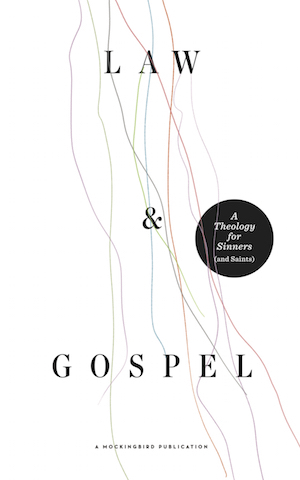
In the most recent On Being interview with Krista Tippett and Brené Brown, they discuss Brown’s latest book Braving the Wilderness and many of Brown’s concepts. Early in their conversation, they talk about how we are made for connection. Brown says, “It’s partly because we are neuro-biologically hardwired for belonging and connection. We’re hardwired to want it, and need it so much, that the first thing we do is sacrifice ourselves and who we are to achieve it.”

Brown’s claims here align with my research on social media and my personal experience with social media. Many of us engage social media because we want to belong. We want to be connected to others. We want to be a part of something bigger than ourselves. In addition to reminding me of research about why we open our social media apps and scroll through our various feeds, the idea of sacrificing ourselves to achieve connection reminds me of a negative effect of social media I’ve read about which is our tendency to shy away from being our true selves on social media. We post mostly about happy, positive, shiny things and we are very apt to virtue signal. We want to feel good about ourselves. And we want others to feel good about us, too.
So this begs some questions: Can we even experience true belonging on social media? Maybe it’s possible for some here and there on rare occasions. This doesn’t mean we should necessarily delete all of our accounts and call it quits. We can try to remember the nature of social media and not expect it to be something it’s not. We can also try to remember who we are and not expect ourselves to be something we’re not.
Brown defines true belonging as:
A type of belonging that never requires us to be inauthentic or change who we are, but a type of belonging that demands who we are—that we be who we are—even when we jeopardize connection with other people, even when we have to say, “I disagree. That’s not funny. I’m not on board.”
So there’s a paradox here. We want to belong, but Brown says to truly belong, we have to be willing to stand alone when we need to do so. She says, “Your level of true belonging can never be greater than your willingness to be brave and stand by yourself.”
While Brown’s directive can be freeing in a certain context, it’s not freeing as a command. When I read her words that tell me to seek to be my true self and seek to belong and be willing to stand alone in order to be my true self, I get all law-y and am quick to think, “Okay, Charlotte. It’s time to be your true self, so figure out how to be authentic and figure out how to stand alone.” This is a lot of pressure, especially when my practice for Lent this year is to give up. And the best way I can define “giving up” is to give up trying to do the things I think I need to do to be who I think I need to be.
When Tippett and Brown transition into a discussion about fear and bravery, Brown makes a great point about how fear drives us. She says, “…it’s so much easier for people to cause pain than it is for them to feel their own pain.” When we are afraid, we can’t sit in our pain. We strike out at others in an effort to make them feel the pain we want to avoid. Brown also quotes Frances Kissling saying, “One of the greatest acts of courage is to be vulnerable with someone with whom we disagree.”

Someone hurt my feelings a couple of weeks ago on Twitter and Instagram. He was mocking people who are being thoughtful about social media, so it felt like a personal attack against me although I have no idea if his actions and statements were directly tied to anything I’ve written or said. There were enough specifics familiar with the topic (negative effects of social media) that I felt shame and pain anyway. But instead of feeling that pain (like Brown recommends), I fired back at him. On social media. In a public forum. I wanted him to feel shame and pain in response. I wanted him to look small and petty, and in the process probably appeared small and petty, which is just awesome, right?
I felt remorse and conviction over my sin after I went after him, but I didn’t understand what to do with the situation. After listening to the conversation today between Tippett and Brown, I began to wonder how I could have handled the situation better using Brown’s theories. My mind started racing with questions, with ways I could have avoided feeling regret. I asked myself: How could I have felt my pain? How could I be vulnerable in that situation? How could I show courage and move forward in spite of my fear of disconnection from this man and others who might also mock something that is important to me? How could I stand alone with this thing that is important to me without worrying about what others think?
So, again, I turned to the law. I felt regret and condemnation. I wanted to figure out how to avoid being someone who is in desperate need of God’s grace. I wanted to be deserving, instead of acknowledging the truth that I am undeserving.
Grace tells me I am a recipient of God’s love and mercy in spite of how I respond to shame, in spite of whether or not I know how to sit in my pain, in spite of any sin I may commit toward someone on Twitter.
By God’s grace, I hope to let go of my little “l” laws that I need to be liked and validated on social media, that I need to respond to others in certain ways, and that I need to be my true self, be brave, and be able to stand alone.
One quote from Law and Gospel totally pegs where I’m at with this Brené-Brown-Social-Media-Little-L conundrum. Authors William McDavid, Ethan Richardson, and David Zahl write:
In this theology of Law and Gospel, a basic tenet is that we can better understand our relationship to the Law of God by examining our relationship with the little-law because the psychological impact of them is often the same. The little-l law—‘Thou shalt be beautiful’ or ‘Thou shalt be successful’—is often more measurable than the Law of God, as well as more salient in people’s lives. That is, the pressure to be well-liked or valued at work is often stronger than the pressure to be a perfect person, and while holiness is usually invisible, things like salary, number of social media followers, and body weight can be easily measured. So it’s easiest to talk about law where most people, regardless of beliefs, actually live: to start from the bottom up.
That’s so me. That’s so us. I am an undeserving recipient of God’s love, mercy. I am a daughter of the King who has nothing to prove to myself, to others, or to God. And here’s more along these lines from McDavid, Richardson, and Zahl:
The Gospel announces that we are justified by grace through faith: not by what we do, or even who we are, but by what Christ has done and who he is. Our guilt has been atoned for, the Law fulfilled. In Christ, the ultimate demand has been met, and the deepest judgment satisfied. In his death and resurrection, our sin was imputed to him, his righteousness to us. Note the past tense: This is not up for grabs.
Some crucial ways we belong to each other are that we all suffer from the human condition so we are all in need of God’s grace. It’s only when we’re rooted in a robust theology of grace that we have the freedom to do what Brown says is necessary to experience true connection—to be authentic and vulnerable. Grace enables us to move toward others with vulnerability and authenticity in spite of our fears.
The good news is I received God’s grace even though I was too caught up in myself and my little “l” laws to discern it at the time. Even though I failed at being my true self, being brave, being willing to sit in my pain, and being willing to stand alone, God poured out (and continues to pour out) His unending, perpetual grace on me—on us—without any pauses, without any conditions that need to be met beyond our faith in Jesus.
It is finished. It’s been finished.

COMMENTS
Leave a Reply













